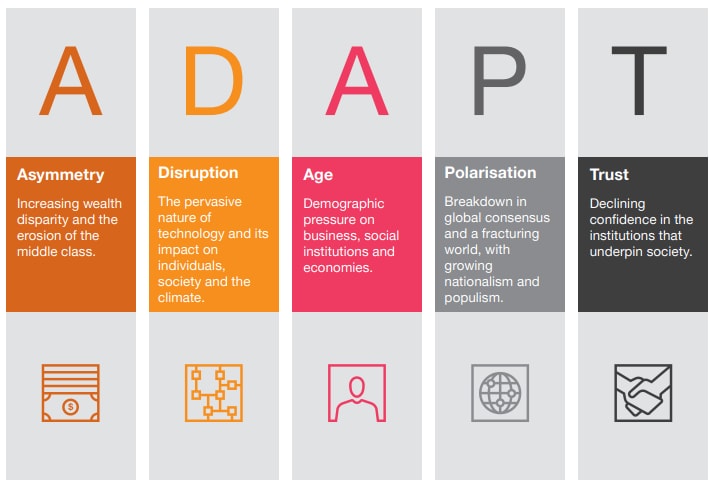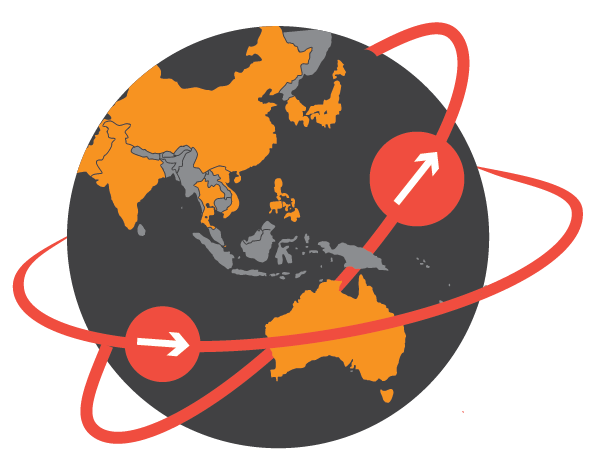{{item.title}}
{{item.text}}

{{item.text}}
COVID-19 has accelerated the global megatrends, requiring us to reexamine our priorities and adapt to drastic changes.
We address these trends using the ADAPT Framework, outlining five urgent global issues and their implications. By identifying opportunities and internalising lessons of the pandemic, we believe Malaysia will be able to emerge stronger from this crisis.
Source: ADAPT, Five urgent global issues and implications, PwC, May 2020
Moving forward, the fundamentals that improved prosperity and living standards in the past can no longer be relied upon to address the inevitable disruptions of the future.
The era of passive growth is over. In order for Malaysia to future-proof itself, we recommend adhering to the 5 pillars below.
Governments and businesses must accelerate their digital adoption in order to stay competitive. This will require identifying the right areas for digitalisation, prioritising technological solutions, and enhancing data privacy and cyber-security policies.
Governments need to facilitate regional business expansion, and attract regional investments to benefit from the growing opportunities across Asia Pacific. This will be even more relevant with the signing of the Regional Comprehensive Economic Partnership (RCEP).
Governments will need to support businesses to restructure their global supply chains and transition to regional networks through developing new hubs. These hubs will allow for corporations, start-ups, academia and governments to work together to drive innovation.
Governments need to prepare a workforce equipped with relevant skill sets for the near and long-term future. This includes identifying the jobs of tomorrow, revising education strategies, and supporting business and local communities to develop the necessary talent for future growth.
Malaysia has a large coastal region that is vulnerable to climate change. There needs to be collaboration between the government, businesses, and the public to reduce our environmental impact. The focus to move towards a net-zero economy will be to build solutions that promote greater agritech solutions to enhance agriculture productivity and food security.
Source: Asia Pacific's time, We must act now, PwC, November 2020
To deliver the country’s development priorities and achieve the goals of our Shared Prosperity Vision 2030, public institutions will need to build the required capabilities and channel resources effectively and efficiently.
With both local and international experience, our team has a deep understanding of regulatory and economic conditions that can help shape strategy, build trust, and achieve transformation, which we believe are foundational for public sector institutions to successfully execute reforms.
International benchmarking
Competitive analysis
Market and landscape review
Strategic roadmap
Policy review
Evaluate policy impact
Determine strategic priorities
Formulate development plans
Formulate regulatory framework and guidelines
Coordinate policy implementation
Governance oversight
Board improvement programmes
Governance framework and practices
Management oversight and controls
Governance, risk and compliance culture
Enterprise risk management
Forensic investigation and fraud prevention
Organisation effectiveness
Evaluate institutional structure and function
Determine strategic priorities
Formulate institutional framework and design
Support organisational and people change
Assess and develop human capital strategy
Operation capabilities
Align service delivery with strategic directions
Optimise operating processes and supply chain
Develop customer-centric operating models
Design performance measurement
Finance management
Public sector accrual accounting conversion
Financial management and reporting
Budgeting and forecasting
Procurement management
Tax compliance and advisory
Corporate finance
Financial position review
Independent business review
Corporate restructuring
Acquisitions and divestment
Capital raising
Tax structuring and advisory
Capital project
Project feasibility and structuring
Financial modelling and analysis
Economics impact analysis
Fundraising advice
Tax structuring and advisory
Digital capabilities
Fourth Industry Revolution and Digital Economy
Digital ID
Customer experience
Big data and analytics
Digital trust and cybersecurity
Robotic process automation
Technology applications
IT strategy and enterprise architecture
IT function assessment and strategy
Enterprise applications (e.g. SAP, Oracle, Workday)
Project management and quality assurance
Driving transformation through the cloud
Digital upskilling
Reskilling and cross-skilling
Target group analysis
Learning and development advisory
Assurance and reporting
Governance, risk and compliance
Strategic sustainability
Climate change and carbon management
Supply chain and operations
Tax and regulatory environment
{{item.text}}

{{item.text}}











